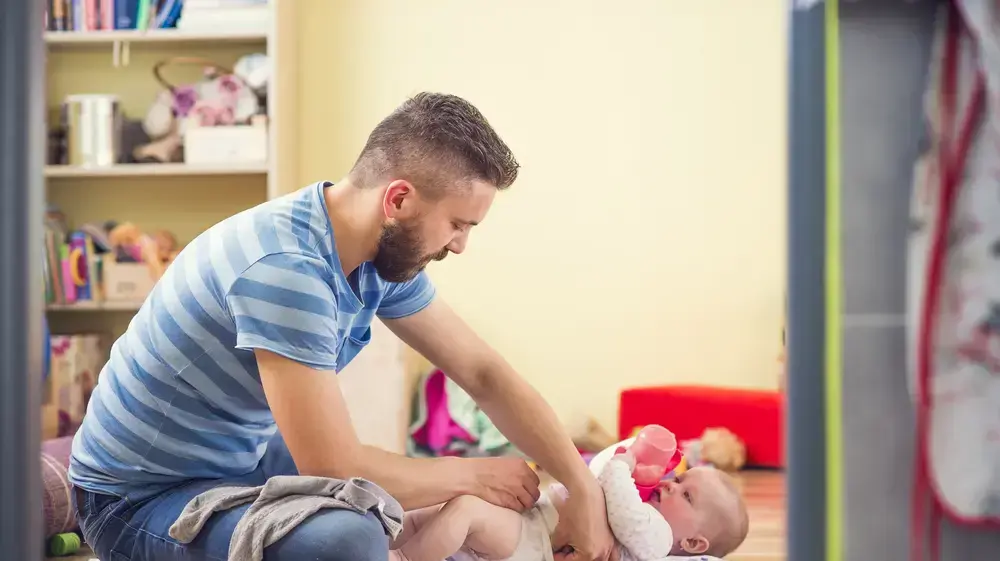health
parenthood
Fathers, here's a really good reason to be full partners in raising a child
Postpartum depression in women is a relatively muted issue, but when it comes to fathers - it is an issue that is not discussed at all.
A new study has found that fathers who are heavily involved in raising a child in the first year gain quite a bit of peace of mind
Tags
psychology
Postpartum depression
Birth
depression
Walla!
health
Friday, 05 March 2021, 07:59
Share on Facebook
Share on WhatsApp
Share on general
Share on general
Share on Twitter
Share on Email
0 comments
There is a mother and there is a father and they both need to take an equal part.
Mom and Dad looking at their baby (Photo: ShutterStock)
Today it is more common to talk about it more - postpartum depression does not only affect mothers.
Fathers can experience similar rates of depression after the birth of their children, although research and awareness on this topic is still in its infancy.
A new psychological study among fathers suggests that fathers who are more involved in the first year of their children's lives show "better results" in the field of mental health.
The study found that fathers who were more confident in their parenting abilities, spent more time with their newborn children and took a larger physical part in the task - diapered, fed, played and put to sleep - also reported low depressive symptoms after one year.
This was true even after considering different demographics, such as age, ethnicity, education, employment status and whether parents live together or are married to each other.
"In general, I think fathers are important in the family," said psychologist Oljid Bashigbin Jr. of the University of California, Long Beach.
"However, in our field, historically, they have been much less researched, especially fathers from ethnic or racial minorities."
More on Walla!
Dad, your kids deserve to come home at four, too
To the full article
The current study, published in Frontiers in Psychiatry, was based on 881 fathers from five regions in the United States who were first interviewed one month after the birth of their child and again after six months and a year.
At each stage the new fathers were asked to fill out a questionnaire, revealing how confident they feel as parents, how often they provide material support and how much time they spend with their baby, alone and with others.
More on Walla!
Postpartum depression can last for years, and even worsen
One-third of fathers suffering from postpartum depression thought of harming themselves or the baby
Until the general public is vaccinated the corona is still here: this is how you will achieve a safe, vocal, comfortable mask that you can breathe with, especially for the period of leaving the quarantine
The findings suggest that paternal involvement is an important predictor of a father's mental health in transition to parenthood, even though a significant proportion of respondents were unmarried and did not live with the infant's mother.
"In general, I think there are two big conclusions. First, involvement in raising your child is not only better for the child, but it is also better for the father. So, fathers, get involved in raising your children, early and often!"
Said Mashgibin.
"Second, I think everyone will understand that paternal depression is a serious issue that requires attention. It affects fathers and thus affects the whole family. Therefore, it is important that we take it seriously."
Further research is needed to understand why these correlations exist, but the authors have come up with some explanations.
Previous studies have shown that greater self-confidence in a parent's parenting abilities is associated with greater satisfaction, and this in turn has been linked to at least depressive symptoms.
"Fathers who feel qualified as parents may be more satisfied with their roles, and as a result have fewer depressive symptoms," the authors claim.
Mixed fathers are more satisfied.
Dad sweatshirt baby (Photo: ShutterStock)
The researchers make it clear that the study can only show a connection, and further studies will need to sever the complex links between security as a parent, spending time with children and mental health.
It could be, for example, that those fathers who are less depressed in general simply tend to feel more confident as a parent.
Participants did not undergo tests of a history of depression or mental health during pregnancy, meaning there is a possibility that some fathers were already depressed before their child was born, which led to lower involvement in their child’s life.
However, studies have shown that mild symptoms of depression are related to changes in hormones like oxytocin, and this hormone rises in fathers when they communicate positively with their children.
In addition, the present study did not examine the quality of a father's relationship with his infant, but may be a question of spending more time with their children protected from future depressive symptoms through changes in their hormones or neural function.
"Future studies should consider planning and testing interventions to assess the impact of paid paternity leave," they concluded.
Share on Facebook
Share on WhatsApp
Share on general
Share on general
Share on Twitter
Share on Email
0 comments










